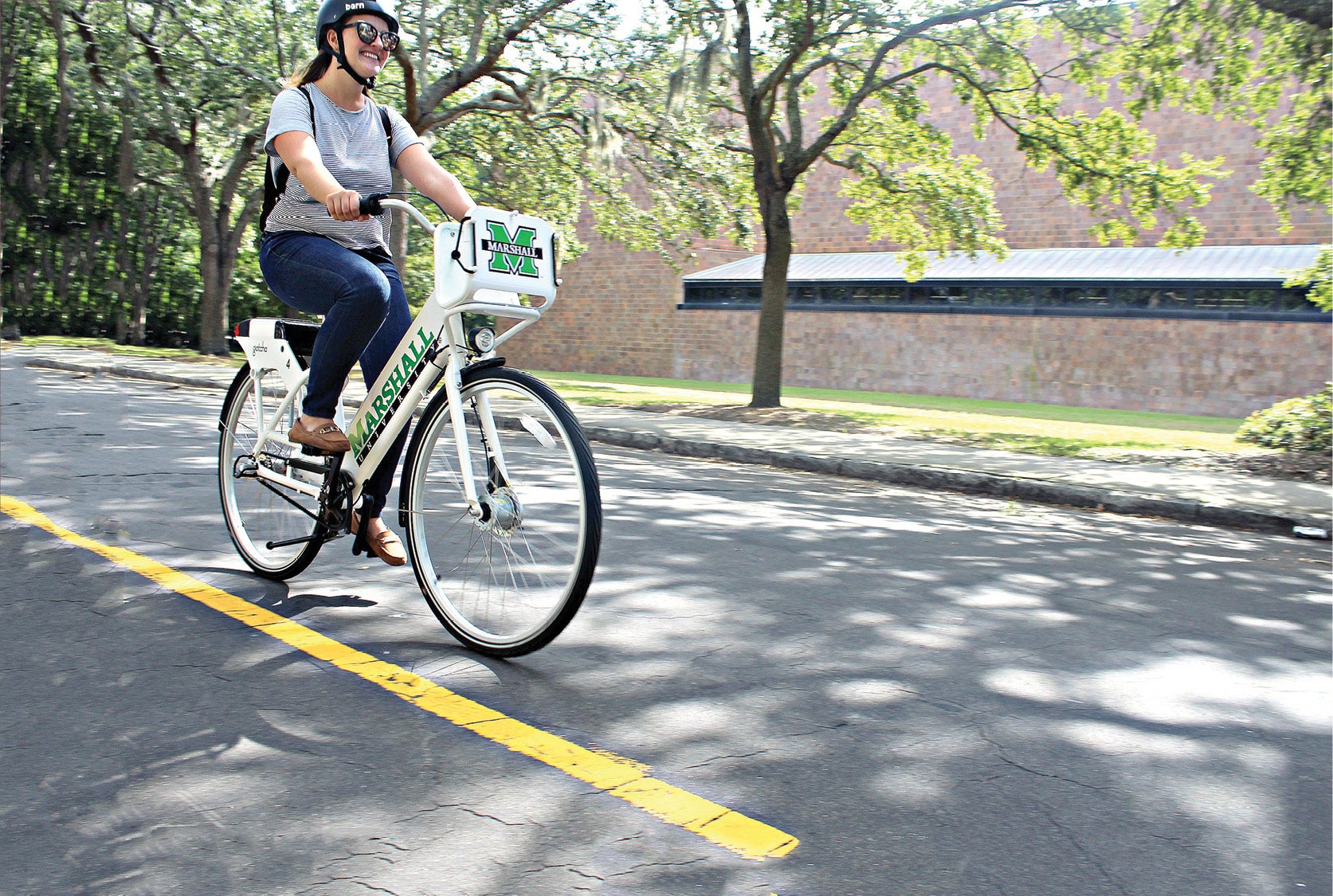 An arrangement with the Sustainability Program provides Marshall students some new wheels.
An arrangement with the Sustainability Program provides Marshall students some new wheels.
Most Huntingtonians are likely familiar with the title “Unhealthiest City in America” that brought national attention and celebrity chef Jamie Oliver to the city in 2010. However, the coordinator for Marshall University’s Sustainability Department, Amy Parsons-White, said the statistics from the new Rolling Thunder Bike Share program tell a different story. The Rolling Thunder launched in October of 2018 with 30 bikes stationed at hubs throughout Marshall’s Huntington campus, and after just one month, the program recorded that riders had burned 163,000 calories. Parsons-White said the program has been a huge success, and students enjoy its ease and accessibility.
“This shows that we want to be fit and healthy; we just need the opportunity,” Parsons-White said. “The program is making us healthier, more active and, overall, more sustainable.”
Maggie Clark, a graduate student from Kentucky studying communication studies at Marshall, said she fell in love with the program and often prefers it to taking a car.
 “I love being able to reserve a bike and pick it up,” Clark said. Even though she has a car on campus, Clark chooses to ride a bike when possible to avoid searching for parking. She said some students drive from one end of campus to the other and search for parking spots several times a day.
“I love being able to reserve a bike and pick it up,” Clark said. Even though she has a car on campus, Clark chooses to ride a bike when possible to avoid searching for parking. She said some students drive from one end of campus to the other and search for parking spots several times a day.
“This is a great way to prevent that,” Clark said. “And I think it’s super fun and a great way to save energy and get exercise.”
After much research, the Sustainability Department settled on the company Gotcha to provide the bikes and hubs, which typically are used with citywide programs. Marshall’s program is one of its smallest. Parsons-White said the company was a little leery of providing such a small bike share; however, any reservations about the success of the program were quickly squashed when Gotcha received the statistics from the program’s first month. She said even Gotcha admitted the numbers were shocking, and it was obvious that exercise was not the program’s only highlight. In addition to the impressive number of calories burned, the program tracked 815 accounts, 2,998 trips and 3,593 pounds of carbon reduced in the first month.
Parsons-White said another reason the program has been so successful is because it is an improvement from the previous bike program, which required students to pick up and return the bikes at the Marshall Recreation Center. Now, students can return the bikes to any of the approved hubs and receive two free hours of ride time per day. Not only is the bike share convenient for students to navigate around campus for classes, but it also provides easy transportation to places around Huntington.
While the program has been wonderful for providing students with easy transportation, Parsons-White said one of the best parts about this program is that it has eased students’ worries about finding something to eat.
“A lot of our students live in food insecurity,” Parsons-White said. “It’s great that they can get out to Pullman Square and places like that, but we are looking beyond that. We don’t live in a part of town that has many grocery stores. If students don’t have a car or a way to get to a grocery store quickly, this allows them to hop on a bike and pedal over to Kroger.”
While Clark hasn’t experienced any issues with the program, Parsons-White said Huntington’s lack of bike lanes can be an issue for some riders.
 “Unless you’re educated about an issue, you don’t know what to do,” Parsons-White said. “So we’re working with the city and students to inform them about the proper protocol for riding a bike in town.”
“Unless you’re educated about an issue, you don’t know what to do,” Parsons-White said. “So we’re working with the city and students to inform them about the proper protocol for riding a bike in town.”
Parsons-White said she has big plans for the Sustainability Department. On top of the Rolling Thunder program, she said the department has received funding to start the first commercial composting facility in the city. The department will use the composted matter on the student gardens and campus grounds, as well as sell it to the public. Parsons-White said this will help decrease additions to landfills and provide green employment for the city. As the Sustainability Department looks forward to bigger goals, she said the bike share program is only the beginning to a healthier, greener community.
“As Marshall University, we need to be the beacon for our community and step up to offer resources,” she said. “We need to be the change that we want to see in our community.”
Kayla Queen Dyer is a teacher and writer living in Huntington. She has published works in the James Dickey Review, Proximity Magazine, So to Speak (George Mason University) and the anthology Voices on Unity: Coming Together, Falling Apart (Mountain State Press). She has received first-place awards for her work in creative nonfiction.
Photos (from second top):
President Gilbert, bicycling aficionado, poses on a bike on the Huntington campus. The program provides 30 bikes at three locations across campus. More information can be found at www.gotchabike.com/marshall.
Marshall student Paige Leonard takes advantage of the bike program on a chilly day in February.
